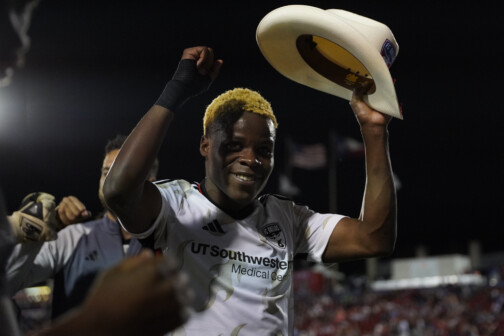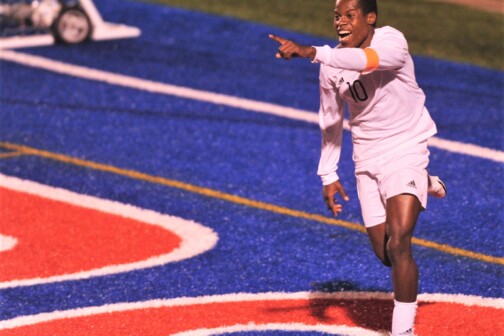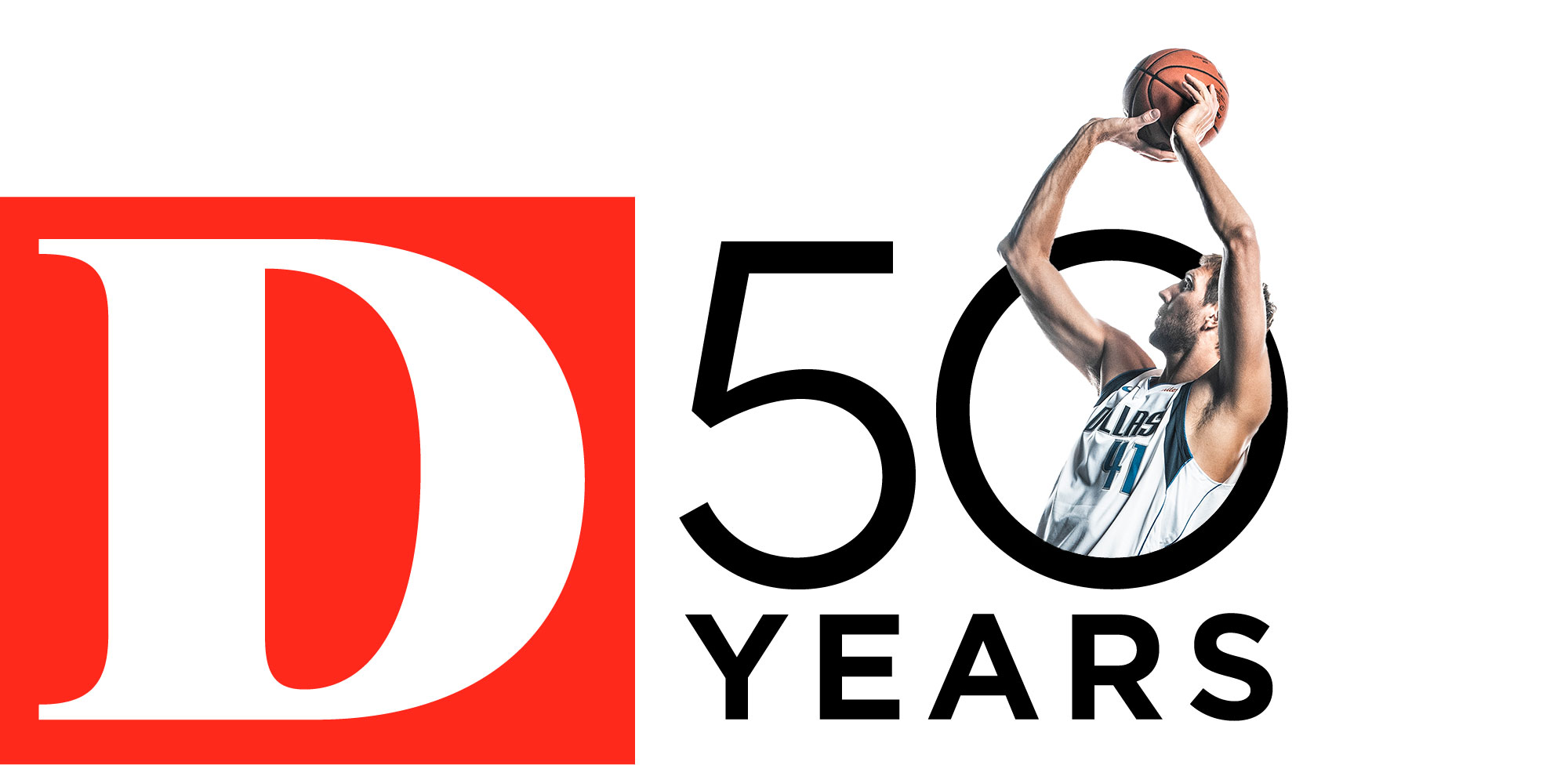Bernard Kamungo had it all planned out. He and his older brother, Imani, knew exactly how he would celebrate his first MLS goal. Had known it for a while. So while it would be a long shot to put the ball in the net in just his second game in an FC Dallas uniform, the winger stayed ready when he subbed in during the 72nd minute of the club’s April 15 match against Real Salt Lake.
With the score tied 1-1 in the 88th minute, Kamungo received the ball wide on the right, switching the field to fellow attacker Jader Obrian, who feinted at the RSL defenders as Kamungo made his way into the box. When left back Marco Farfan penetrated the defense on an overlap past Obrian, Kamungo saw an opportunity. He broke toward the top of the six-yard box, getting just enough room between himself and his defender to find the ball as Farfan sent in a low cross. With a thundering left foot, he smashed the ball past the RSL goalkeeper for what became the game-winning goal.
It was time for his celebration.
He did none of it.
As the crowd roared around him, Kamungo says his mind went blank. All he could think to do was sprint to the corner and into Farfan’s arms as his team mobbed him in front of a histrionic Toyota Stadium crowd.
It’s a safe bet that few of those fans knew who he was. Even fewer knew that less than six years ago, Kamungo had been living in a mud hut in a refugee camp in Tanzania with his parents and five siblings, without electricity or plumbing. Or that he once quit school at 11 to try and help his family make ends meet.
When they watched Kamungo’s head of bleached-blond hair peek through a sea of teammates, they didn’t see someone who had never played for a youth soccer club, whose experience with organized soccer was a few years at Abilene High School prior to signing a professional contract after an open tryout. They didn’t know they were seeing a 21-year-old living his dream in the face of impossible odds.
“This story in itself is once in a lifetime,” says Matt Denny, general manager of North Texas Soccer Club, FC Dallas’ developmental team. “It’s Hollywood.”

There are so many ifs.
If Kamungo had ended up in another country besides America.
If he instead played another sport in the United States.
If he didn’t wind up in West Texas, where the nearest professional club had professional tryouts for its developmental club.
Then again, what if Kamungo were born somewhere other than Nyarugusu, a refugee camp in western Tanzania? There wasn’t much hope to be found in the massive settlement of 150,000 people, which formed in 1996 when tens of thousands of refugees crossed the border to escape civil war in the Democratic Republic of Congo. Kamungo’s parents had lived in the camp for six years before Kamungo was born in 2002.
He grew up in the camp, speaking Swahili with his family and learning French in the refugee school while his family eagerly waited for their number to be called for resettlement. Even at a young age, Kamungo was aware of the stark nature of his surroundings: he secretly quit school when he was 11 to earn money selling clothes to buy food for the family. He didn’t have the heart to tell his parents he was heading off somewhere besides classes each morning.
His escape was pickup soccer, which Kamungo and his friends played by fashioning soccer balls from medical gloves or condoms and wrapping them with old clothes. He always knew he was one of the better players around, despite never playing on an organized team nor having any formal coaching.
Still, he never dreamed of being a professional soccer player. He didn’t dream of anything, really. People living day to day in refugee camps don’t have the luxury of thinking about 10-year plans. It’s hard enough preparing for the next day, or the next meal. “I didn’t have any vision of the future because I was worried about tomorrow,” Kamungo says. “I was living in the moment.”
Life changed at 14, when he learned the International Rescue Committee would be resettling his family to the United States. After two decades in a camp where food was hard to come by, where opportunities were few and far between, the family had hope. While he had vague ideas of what life in America was like from movies and TV shows, he didn’t have any expectations other than that there would be enough food for everyone. That would be good enough for him.
Kamungo has forgotten some of the details about his arrival in the United States, starting with which airport the family landed in. (It was probably DFW.) But he does remember how it felt to arrive in their new hometown, Abilene. Suddenly, the Kamungos had air conditioning, heat, indoor plumbing—amenities they’d never lived with before. A refrigerator, too, which was stocked with unfamiliar but edible food and plenty of it. West Texas would do just fine.
But he didn’t speak a word of English, and his rudimentary language skills and shy personality made the adjustment to American school difficult. He was assigned to eighth grade and ESL classes. There were many days when he had no idea what was going on; he’d sit in the back of the class without saying a word. That hardly bothered him. Some of the mundane realities of life in America were too good to be true.
“The school was so beautiful,” he says. “And to be able to get food in the middle of the school day was a big thing for me.”
While he struggled to communicate in the classroom, he found a common language with his peers on the soccer field. He joined the middle school team during his first semester in Texas, building enough of a reputation for himself that Abilene High School coach Kyle Riese eagerly anticipated Kamungo’s arrival to the varsity squad. Riese was not disappointed. Kamungo dominated as a high schooler, scoring multiple goals a game and never failing to win intrasquad scrimmages, no matter who lined up alongside him. In 2020, Kamungo’s junior season was interrupted by COVID-19; when he returned for his senior year, Riese noticed a change in his player’s physique and attitude. Kamungo was stronger, more skilled, more determined.
“We knew this guy was way different,” says Riese, who has season tickets to FC Dallas and was behind the bench the night Kamungo scored the game-winning goal. “He was beyond everyone’s level, and nobody could stop him.”

But Abilene is no soccer hotbed, and without any money to travel to a club team—his parents worked in a local cookie factory making less than $10 an hour—Kamungo’s opportunities beyond graduation seemed limited. He never attracted many college or professional scouts outside of a few local schools reaching out.
Maybe that would have stopped him several years and a different country ago. But a taste of success with his high school—plus playing on a local men’s league team of African immigrants—had given Kamungo confidence. After all, this was America, where dreams come true. In addition to electricity and indoor plumbing, the peace and prosperity of the United States allowed him to develop something he never allowed himself to have in Tanzania: long-term goals. He wanted to be a professional soccer player.
Most teenage soccer stars have supportive families, and Kamungo is no exception. More than anyone, that meant his older brother. Throughout Bernard’s life, Imani Kamungo has been his booster, his protector, his champion. And Imani didn’t believe Bernard’s career ended in high school, either.
So, in January 2021, Imani helped his brother plot the best path forward. There may not be college scholarships, but there were professional open tryouts, if they could scrape the money together. That’s how they settled on FC Dallas’: it required only a $90 entry fee while other teams charged as much as $500.
When Kamungo showed up for the big day, he was intimidated. It all seemed so serious, so organized. But once the games began and the ball began to move, things simplified. He realized the competition wasn’t anything he couldn’t handle—that, once again, he was better than most of the players on the pitch. He scored a couple of goals, notched a few assists. Coaches began to pull him aside and get to know him.
The next day, FC Dallas’ second team, North Texas Soccer Club, came calling. Kamungo was invited to preseason training.
There was just one problem: he was still in the middle of his senior year of high school, and the soccer season had just begun. If training went well, he would join the squad—that would mean leaving school, missing out on his senior season, and not graduating with his high school class. But for Kamungo, there was no decision to be made. He broke the news to Riese and the team, headed to Frisco, and never looked back.
In some ways, this was a bigger stop than coming to America. Kamungo had never lived apart from his family. He was nervous about training with professionals in Frisco. That didn’t stop him from impressing enough to earn his first professional contract with North Texas Soccer Club once preseason concluded.
It was motivation as much as validation. Kamungo realized he needed to raise his level, especially with his fitness, tactics, and speed of play. “I was just chilling in high school and would stay up top and find the ball,” he says. “Training in Frisco was a lot of running and not fun at first, but I knew what I was there for and put the work in.”
That work paid off. In a little more than two seasons with NTSC, he scored 22 goals in 52 games, on the way to becoming the club’s all-time leading scorer. He frequently trained with the first team and occasionally traveled with FC Dallas, eventually making his MLS debut at San Jose last year.
“It was crazy, but it built my confidence,” he says. “I was able to connect a pass, dribble, and I realized everything was possible.
“I can play in this league.”
The FC Dallas front office felt the same way and offered Kamungo a four-year contract in August. That, according to Denny, NTSC’s general manager, made Kamungo is the first player to go from open tryouts all the way to FC Dallas. Thus far, he’s made eight substitute appearances and played 118 minutes this season. In June, the Tanzanian national team invited him to its international camp before its matches during the international window. Not bad for a player who was focused on scoring goals against the Abilene Cooper Cougars a little more than two years ago.
“He has progressed a lot from the first time I saw him,” says FC Dallas head coach Nico Estevez. “He is gaining confidence in the club, and everyone loves him and the way that he is as a person. He is a great example to show that if you work hard, you can get to the professional level.”
Though Kamungo never planned to be a professional soccer player when he was scraping by in an African refugee camp, he can now set long-term goals and has the time to grow into them. On the pitch, he sees the next phase of that growth as breaking into and establishing himself in the starting lineup. His pace and ability to create chances are needed in Frisco, as FC Dallas is 21st of 29 in MLS in scoring so far this year. Away from it, he made time to earn his high school diploma, fulfilling a promise he made to Denny upon signing. He also became an American citizen, a process aided by studying alongside England-native Denny, who also earned his own citizenship within the past year.
Despite international call-ups and scoring game-winners, Kamungo insists he’s still staying in the present like he did back in Tanzania—but for a much happier reason: “I am just enjoying where I am right now,” he says. He has gone from kicking an inflated condom in Tanzania to the dusty high school soccer fields of West Texas to tens of thousands cheering him on in one of the world’s biggest leagues, all in seven years’ time. It would sound like a fairytale, were it not so hard-earned. Call it a Hollywood beginning.
Author







